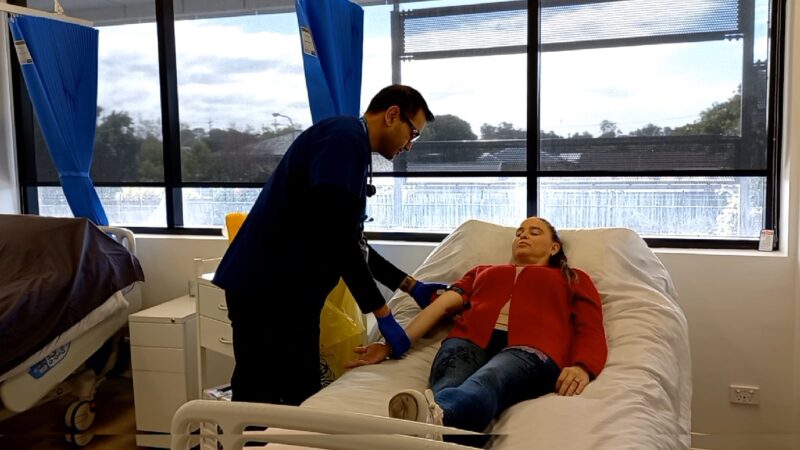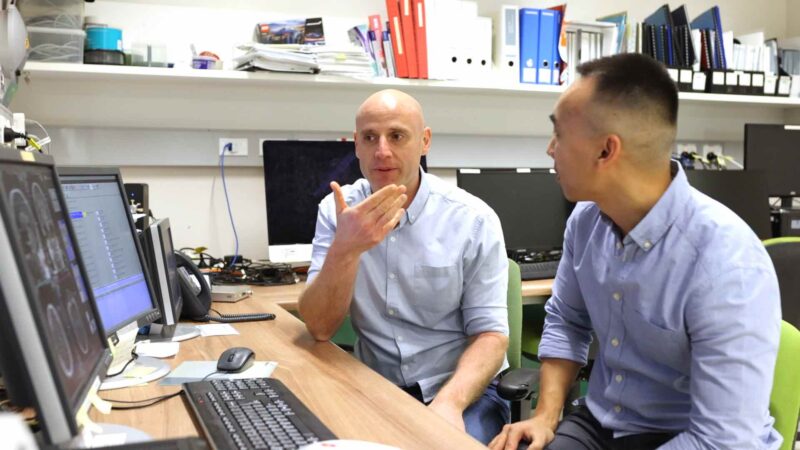LINK BETWEEN LEVELS OF EXTRACELLULAR VESICLES OR EVS IN THE BLOOD AND TISSUE DAMAGE CAUSED BY DISEASES Cellular couriers: Body’s ‘delivery trucks’ could lead to new cancer blood test
With
Dr Georgia Atkin-Smith, Senior Postdoctoral researcher and NHMRC Investigator Grant Research Fellow, WEHI, Melbourne, Australia
Associate Professor Edwin Hawkins, Laboratory Head, WEHI, Melbourne, Australia
CASE STUDY
Filmed in Melbourne | March 2025
A landmark study led by WEHI and La Trobe University has found a potential new diagnostic marker that could be used to better detect the level of tissue damage in our bodies.
This study revealed, for the first time, a link between levels of EVs in the blood and tissue damage caused by diseases such as leukaemia.
Researchers hope to leverage the critical new insight to develop a blood test to monitor cancer patients with tissue damage, which could, in future, enhance treatment strategies for blood cancers and other diseases.
Extracellular vesicles (EVs) are like small delivery trucks in the human body that are dispatched by our cells to distribute important materials like proteins, fats and genetic information to other cells.
This delivery system helps cells communicate with each other, especially when they are under stress or dying.
Research into how EVs form and their link to disease progression is challenging because of their small size, with most studies restricted to a ‘cells-in-a-dish’ approach.
In an unprecedented study, researchers were able to overcome this significant barrier by imaging live EVs inside the bone marrow of mice.
The study involved a significant collaboration with Professor Ivan Poon, Director of the La Trobe Research Centre for Extracellular Vesicles (RCEV) – the largest group of EV researchers in the Southern Hemisphere.
The WEHI research team is now assessing whether EVs can be used as a biomarker in acute myeloid leukemia (AML) patients. They hope to develop new tools and techniques that would allow clinicians to determine the impact of disease on healthy tissue, and assess the disease progression by analysing patient samples.
The study, published in Nature Communications Oct 2024, also involved collaborations with the University of Melbourne, The Florey, Olivia Newton-John Cancer Research Institute, Peter MacCallum Cancer Centre and Monash University.
The research was supported by the National Health and Medical Research Council, Australian Research Council, CASS Foundation, Jack Brockhoff Foundation, L’Oreal UNESCO For Women in Science, Victorian Cancer Agency, a Sir Clive McPherson Family Fellowship and a Rae Foundation grant.
Source: WEHI News
You Might also like
-
Dr Nischal Sahai
RESEARCH IN BRAIN COMPUTER INTERFACE
@ SYNCHRON
MELBOURNE, VICTORIA, AUSTRALIA -
Professor Alex Fornito
PROFESSOR ALEX FORNITO
HEAD OF THE BRAIN MAPPING AND MODELLING RESEARCH PROGRAM
TURNER INSTITUTE FOR BRAIN AND MENTAL HEALTH, MONASH UNIVERSITY
VICTORIA, AUSTRALIA -
Forensic psychiatry research in the setting of the justice system
Prof Kimberlie Dean is Head of the Discipline of Psychiatry and Mental Health at UNSW. She was appointed to the inaugural Chair in Forensic Mental Health at UNSW in 2011, a joint appointment with Justice Health NSW. She also holds a Clinical Academic appointment as a Consultant Forensic Psychiatrist with Justice Health NSW. She is Academic Program Director for the Masters Forensic Mental Health at UNSW.



